Passover Books (Page 3) |
I have linked the books to
Amazon.com.
As a warning, I have put up pictures of the book covers to give you
somewhat an idea of the style of each book (I know, I know. "Don't
judge a book by its cover") so the pages may load slowly.
For Family Haggadahs, go to the Siddurim, Haggadahs, and Other Prayerbooks Page
For books containing all the Jewish holidays, go to
The
Holiday Collection Page
For more books about the Exodus, go to the Stories About Moses, Miriam, and Aaron Page.
For Passover videos, go to the Video Collection Page
If this page came up without frames, Click here to see the complete website
Other Pages of Interest:
Passover Books ...
(Page 1)
(Page 2)
(Page 3)
(Page 4)
(Page 5)
(Page 6)
(Page 7)
Jewish Holiday Books ...
Jewish Holiday Collections
(Page 1)
(Page 2)
(Page 3)
(Page 4)
(Page 5)
|
Shabbat Books (Page 1)
(Page 2)
(Page 3)
(Page 4) |
Rosh Hashanah & Yom Kippur Books
(Page 1)
(Page 2)
(Page 3)
|
Sukkot & Simchat Torah Books
(Page 1)
(Page 2)
(Page 3)
|
Hanukkah Books (Page 1)
(Page 2)
(Page 3)
(Page 4)
(Page 5)
(Page 6)
(Page 7)
(Page 8)
(Page 9)
(Page 10)
(Page 11)
(Page 12)
(Page 13)
(Page 14)
(Page 15)
(Page 16)
(Page 17)
(Page 18) |
Tu B'Shevat & Lag B'Omer Books
(Page 1) |
Purim Books
(Page 1)
(Page 2)
(Page 3)
|
Passover Books
(Page 1)
(Page 2)
(Page 3)
(Page 4)
(Page 5)
(Page 6)
(Page 7) |
Shavout Books (Page 1)
Easy Reader and Picture Books ...
Jewish Children's Books (General) |
Jewish Board Books |
Biblical Stories for Children |
Jewish Holiday Books |
Jewish Family Cookbooks |
Folktales and Talmudic Stories for Children |
Jewish Life Books (Mitzvot, Keeping Kosher, etc.) |
Jewish Life Cycle Books |
Family Haggadahs |
Children's Prayerbooks |
Introductory Hebrew Books |
Jewish History and Historical Fiction Picture Books |
Israel Books
Middle School and YA Books ...
Bar Mitzvah Books |
Jewish Fiction |
Historical Fiction |
Torah Study |
Prayer and Jewish Life Books |
Jewish Holidays |
Jewish Biographies |
Jewish History Books |
Holocaust Books for Teens |
Israel Books
And More ...
Jewish Books for Children |
Bar Mitzvah Books |
Jewish Parenting Books |
Hanukkah Books |
Jewish Music for Children |
Jewish Videos |
Jewish Toys and Gifts |
Jewish Gift Baskets and Gourmet Food |
Jewish Jewelry |
Amazon.com Coupons, Promotions, and Sales
Jewish Holiday Books ... Jewish Holiday Collections (Page 1) (Page 2) (Page 3) (Page 4) (Page 5) | Shabbat Books (Page 1) (Page 2) (Page 3) (Page 4) | Rosh Hashanah & Yom Kippur Books (Page 1) (Page 2) (Page 3) | Sukkot & Simchat Torah Books (Page 1) (Page 2) (Page 3) | Hanukkah Books (Page 1) (Page 2) (Page 3) (Page 4) (Page 5) (Page 6) (Page 7) (Page 8) (Page 9) (Page 10) (Page 11) (Page 12) (Page 13) (Page 14) (Page 15) (Page 16) (Page 17) (Page 18) | Tu B'Shevat & Lag B'Omer Books (Page 1) | Purim Books (Page 1) (Page 2) (Page 3) | Passover Books (Page 1) (Page 2) (Page 3) (Page 4) (Page 5) (Page 6) (Page 7) | Shavout Books (Page 1)
Easy Reader and Picture Books ... Jewish Children's Books (General) | Jewish Board Books | Biblical Stories for Children | Jewish Holiday Books | Jewish Family Cookbooks | Folktales and Talmudic Stories for Children | Jewish Life Books (Mitzvot, Keeping Kosher, etc.) | Jewish Life Cycle Books | Family Haggadahs | Children's Prayerbooks | Introductory Hebrew Books | Jewish History and Historical Fiction Picture Books | Israel Books
Middle School and YA Books ... Bar Mitzvah Books | Jewish Fiction | Historical Fiction | Torah Study | Prayer and Jewish Life Books | Jewish Holidays | Jewish Biographies | Jewish History Books | Holocaust Books for Teens | Israel Books
And More ... Jewish Books for Children | Bar Mitzvah Books | Jewish Parenting Books | Hanukkah Books | Jewish Music for Children | Jewish Videos | Jewish Toys and Gifts | Jewish Gift Baskets and Gourmet Food | Jewish Jewelry | Amazon.com Coupons, Promotions, and Sales
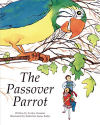 The Passover Parrot By Evelyn Zusman |
Leba's parrot is the only one in the family who will listen to her practice the Four Questions, but when the parrot joins the seder, even Leba is amazed at the unforgettable evening that unfolds.
Leba wants someone to listen to her practice the Four Questions, but everyone in the family is too busy getting ready for the start of Passover. Leba sings for her parrot, Hametz, instead. When it comes time for the Seder, Leba begins the Four Questions, and Hametz repeats every verse. After Hametz is banished upstairs, his fondness for the Four Questions leads to a clever resolution to a potential problem. The soft watercolors convey the warmth of a large Brooklyn family. Children will relate to the angst Leba feels at singing the Four Questions. |
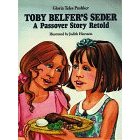 Toby Belfer's Seder: A Passover Story Retold |
Welcome to the Belfer house, the only Jewish home in a small South Louisiana town. The celebration of Passover is coming and Toby Belfer's best friend, Donna, is coming over to share in the festivities of the Seder supper. Donna does not know much about the celebration of the Seder because at her church they celebrate Easter. During one magical night she will experience the traditions and learn the history of the Jewish feast of deliverance.
This Passover tale recounts not only how Toby and her friend help the family prepare for the festival, but also it tells the story of how the Israelites came to freedom more than three thousand years ago. Donna comes to understand the symbols of the Seder supper, the legend of the prophet Elijah, and why Jewish people only serve certain food like unleavened bread during the celebration. Told within the frame of a friendship between a Jew and a Gentile, Toby Belfer's Seder is appropriate for all faiths. As the story unfolds it helps children understand the relationship between Passover and Easter. The special activities in this book include rhymes children can use for their own celebrations, an example of how to join in the search for the afikoman, and a lesson in the striking parallels between Passover and Easter. Whether teaching the faith or bridging cultural differences, this book is an entertaining way to show young readers how Passover is a festival of peace. The Belfers are the only Jewish family in their Southern town. When Toby Belfer invites her non-Jewish friend over to join their Seder, Donna isn't sure what to expect. Pushker's picture book includes the Belfer's description of the holiday of Passover and Donna's observations of the Belfer's Seder. The plot to the story is superficial, but the explanations of the customs of Passover make this a perfect book for sharing to a Jewish and non-Jewish audience. |
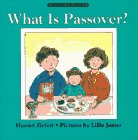 What Is Passover? (Lift-The-Flap Book) |
The traditions of Passover are simply described in a lift-the-flap book that introduces this Jewish holiday to the very young. Jake learns the history of Passover, helps get ready for the Seder, and finds the afikomen. Watercolor illustrations enhance the lively lift-the-flap format.
|
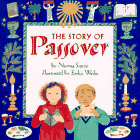 The Story of Passover By Norma Simon |
Most American Jews would say that Passover, with its message of
freedom, is the most significant Jewish holiday. The problem is
that it's a complicated story that is hard to explain to children.
But Norma Simon's The Story of Passover should make things a lot
easier. She starts with an informative and thorough retelling of the
biblical story, and a quick look at the actual history. She then
explains how this important holiday has been celebrated throughout
history and throughout the world, including a concise summary of
the Seder. There are even a few recipes. This book is important
not only to parents who want to teach their children about Passover
but to adults who are just learning about it themselves. It will
also provide teachers with an excellent teaching tool.
|
 Josh Discovers Passover By Larry Stein |
Josh brings kids right into the Passover story as he travels with Moses and lives out the incredible adventures and meaningful events of Passover.
Don't just read about Passover... live it with Josh! Each page is filled with action. At the top of each page, Josh tells the story in his own words as he lives out the events. The bottom of each page contains either a fun multiple-choice question or a meaningful explanation of Jewish traditions. |
 Ten Plagues of Egypt By Shoshana Lepon |
A fabulous book to give to children before Pesach. The Ten Plagues
of Egypt retells the biblical account of the ten plagues in lively rhyming
verse, enhanced by brilliantly colored illustrations. It's also a great learning tool
and is used in many schools. The back of the book contains helpful questions
for review and a clever "Did you know?" page.
|
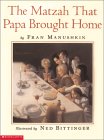 The Matzah That Papa Brought Home By Fran Manushkin |
The sprightly text of this cumulative Passover tale ("This is the
matzah papa brought home. / This is the feast that Mama made with
the matzah that Papa brought home. / This is the Passover Seder
we shared to eat the feast that Mama made," and so on) is simple
and lively enough for even the youngest child to enjoy.
The curious can turn to several follow-up pages that outline the
story of Passover and explain the traditions (like the Four
Questions) and special foods (like haroset and matzah) mentioned
in the story. The section will indeed answer some basic questions
about Passover, but what the book actually does best is convey
the feeling of closeness and community engendered by the
celebration, which Bittinger adeptly captures in double-page-spread
oil paintings that glow as brightly as the candles on the seder
table.
|
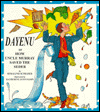 DAYENU or How Uncle Murray Saved the Seder |
Uncle Murray and Aunt Helene decide that the Passover seder is too much work. But cleaning leads to shopping, and shopping leads to cooking, and before you know it, a joyous celebration is underway. |
 Make a Wish, Molly |
In a companion to
Molly's
Pilgrim (1983), Cohen offers another glimpse of this young Russian
immigrant's life in America. When Molly is invited to a classmate's ninth
birthday party, she is pleased to be included and excited to learn about American
customs. Then Mama reminds her that the festivities are scheduled during
Passover and that as a Jew she is not permitted to eat regular bakery goods
during that time. Angry that her background and religion seem to hinder her
assimilation, Molly secretly decides to eat the cake anyway. When she is
unable to follow through with her intentions, the other girls misunderstand,
and Molly leaves the party in tears. Molly's classic dilemma -- betraying
her beliefs in order to fit in versus loyalty to her ideals at the expense
of acceptance -- is a poignant one that will strike a chord with young
readers everywhere. Although not all children will have the strength to
choose as Molly does, they will find this a thought-provoking story that
may lead to discussions about friendship, prejudice, and self-esteem.
The firmly shaded pencil drawings suggest an early-twentieth-century
setting. A wonderful choice for a primary read-aloud.
|
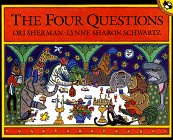 The Four Questions By Lynne Sharon Schwartz |
Discover the meaning of Passover by finding the answers to The Four
Questions, while observing richly colored scenes and delicate Hebrew
calligraphy that joyfully extend the meaning of this venerable
tradition. "A striking picture book."--Kirkus Reviews
Why is this book different from all other books? It is an elegant, accessible retelling of the Four Questions asked at a Passover Seder. Sherman's glorious jewel-toned paintings are patterned and richly detailed, with a curious menagerie of animals, wearing yarmulkes and some clothing, acting out the symbols of the holiday. Each of the Four Questions is asked in English; turn the book upside down, and the question appears in Hebrew calligraphy. The facing picture is split, with images facing each direction as well. This technique enables the book to be used during the Seder: those on each side of the table can see what is going on. The story itself is exciting and timely, telling of the slavery of the Jews, the ten plagues, the exodus from Egypt, and the hope for freedom throughout the world. The book explains the history and the symbolism of the holiday and the items on a Seder plate. The final spread shows the order of the Seder. The pictures are exquisite, the telling lyrical. This is the most eye-catching, most refreshing book available for young children on this holiday. Older children can get more information from Miriam Chaikin's Ask Another Question: the Story and Meaning of Passover, but The Four Questions will find a wider appreciative audience. |
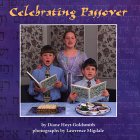 Celebrating Passover By Diane Hoyt-Goldsmith |
Hoyt-Goldsmith and Migdale expand their series on American celebrations with this offering that details a Reform Jewish celebration of Passover. Hoyt-Goldsmith focuses on nine-year-old Micah Kamrass, explaining how he and his extended family prepare for and celebrate the week-long holiday. She recounts the festival's origins nearly 3,000 years ago, describes some of the special foods that are served, and explains the components and proscribed order of a seder, the ceremonial meal held during the first two nights of the festival. Illustrated sidebars depict the ancient story, and Lawrence Migdale's crisp, color photographs show the members of the Kamrass family and their activities, with captions clarifying such customs as the search for the afikomen (hidden matzoh). Festivities in Orthodox and Conservative Jewish households may vary. An attractive and useful choice for the holiday shelf; recipes, songs, and a glossary are a bonus.
One of a series of Holiday House books about American celebrations, this book presents a family in Cincinnati, Ohio, celebrating the Jewish holiday of Passover. While the text does not provide vastly different information from other nonfiction picture books explaining this holiday, the full color photographs provide a distinctly up-to-date feel. Educators will be comfortable showing these pictures of children dressed in modern clothing, setting the holiday table and cooking with grandparents. The book begins with a picture of Micah, a nine-year-old boy smiling over the handlebars of his bike. The straightforward text says that Micah is a Cincinnati Reds fan and enjoys spring for two reasons--baseball and Passover. This depiction of ordinary American children celebrating a culturally specific holiday sends a positive message. There is a photograph of Micah, eating matzah at school. The caption states that his non-Jewish friends enjoy tasting matzah, too. Other photographs show traditional Passover foods, such as matzah and gefilte fish. The text includes a synopsis of the Passover story and definitions (including pronunciations) of Passover terms. Lines from a Reform Jewish Passover service are quoted. All in all, this book is a useful and attractive explanation of a Jewish holiday. |
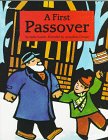 A First Passover By Leslie Swartz |
A young boy's journey from the Soviet Union to America gives him a deeper insight of Passover. In the Soviet Union, Passover must be practiced in secret. When Jasha and his family are allowed to go to the United States, they can celebrate the Jewish religion openly. |
 Learning About Passover By Barbara Soloff Levy |
The meaning of Passover and its place in Jewish culture is explained in this instructive little book. Twelve pages of easy-to-read text and colorful sticker illustrations acquaint youngsters with the Egyptian Pharaoh who held the Hebrews captive, Moses' role in leading his people safely to Israel, and the celebration that commemorates this historical event, including the Seder dinner and foods representing the Passover story.
|
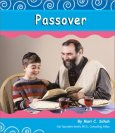 Passover By Mari C. Schuh |